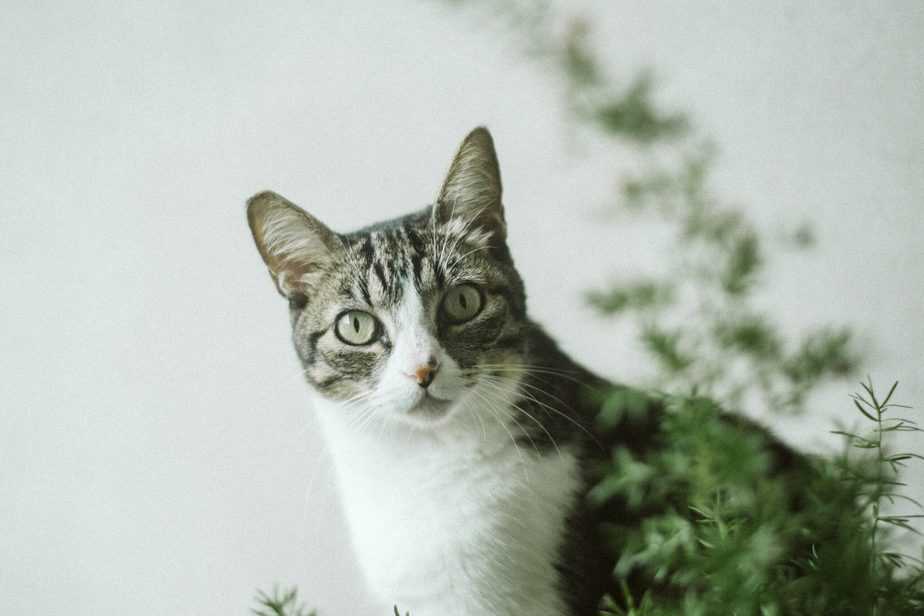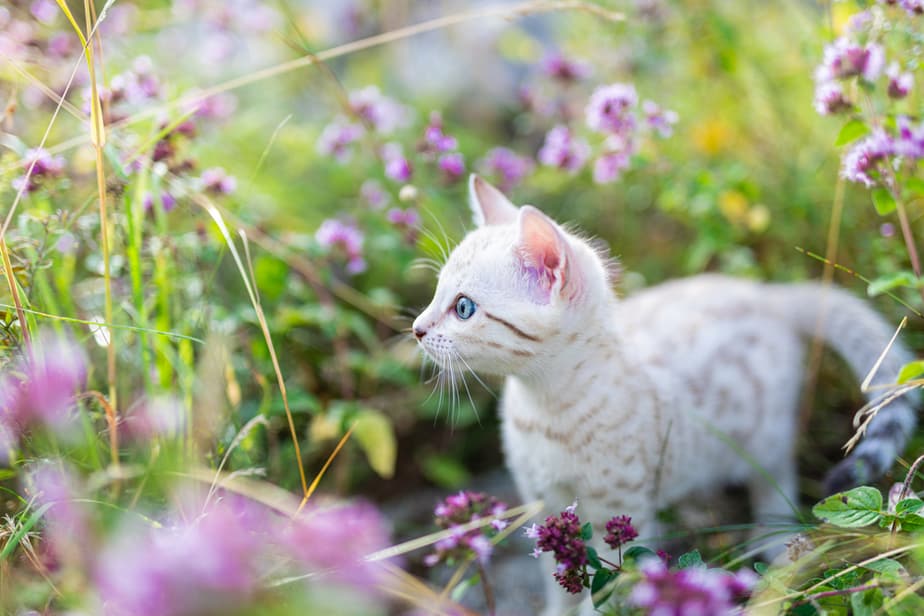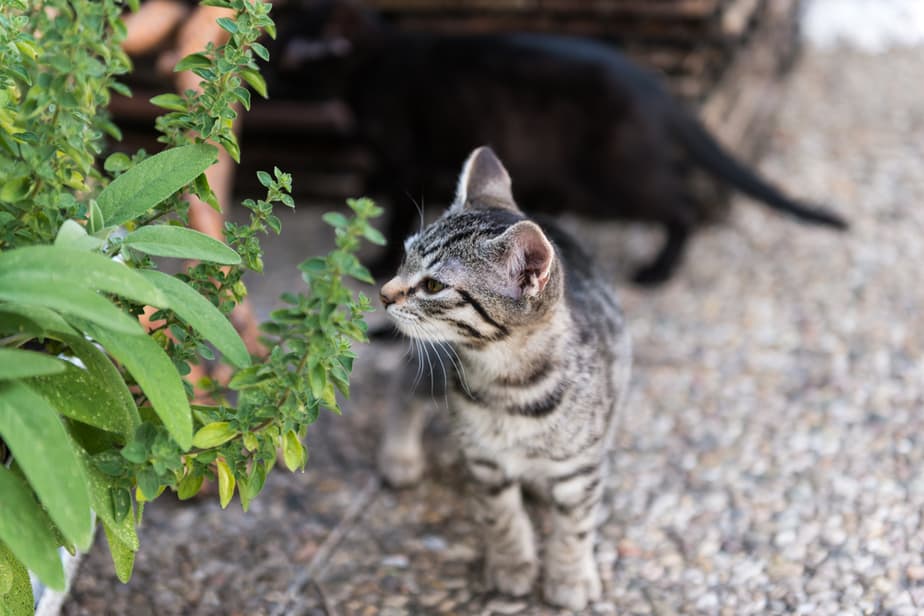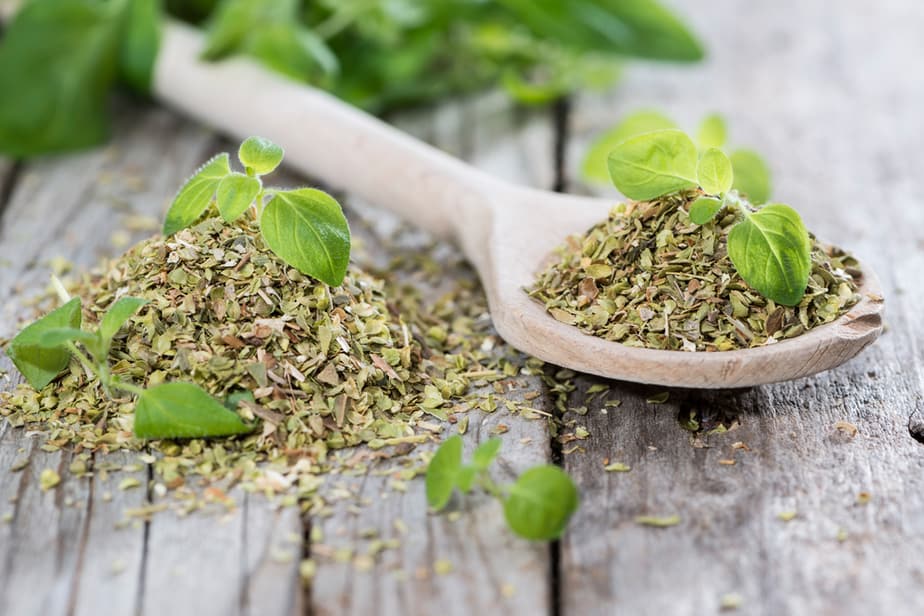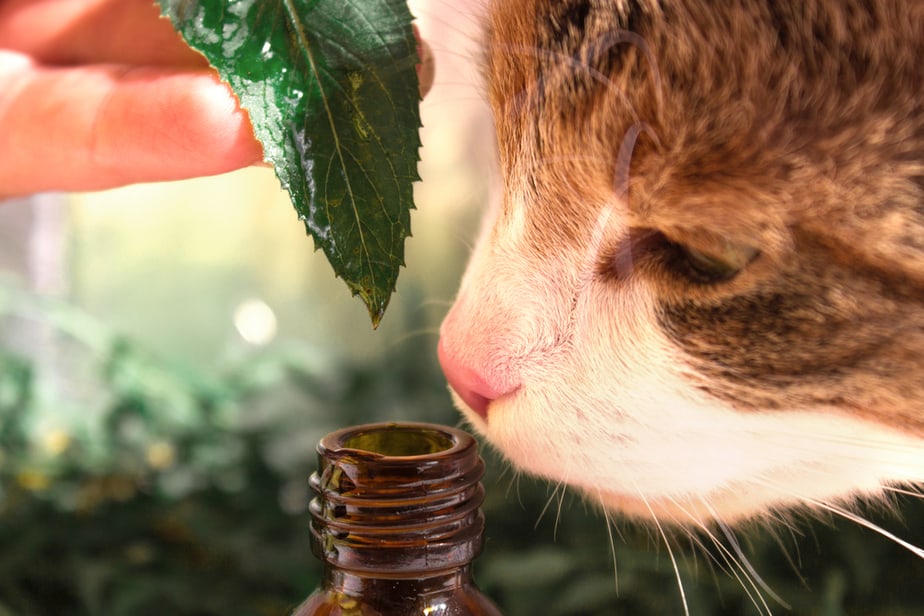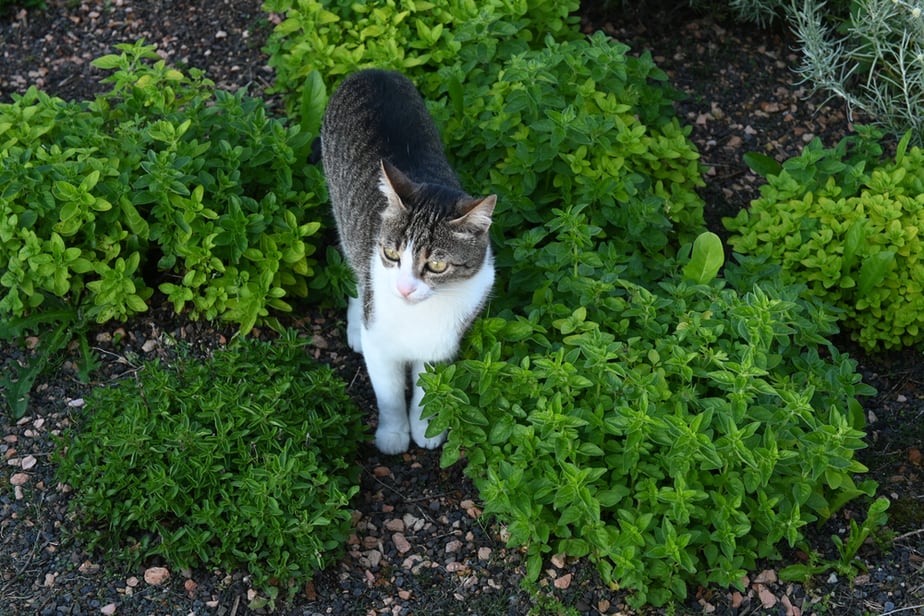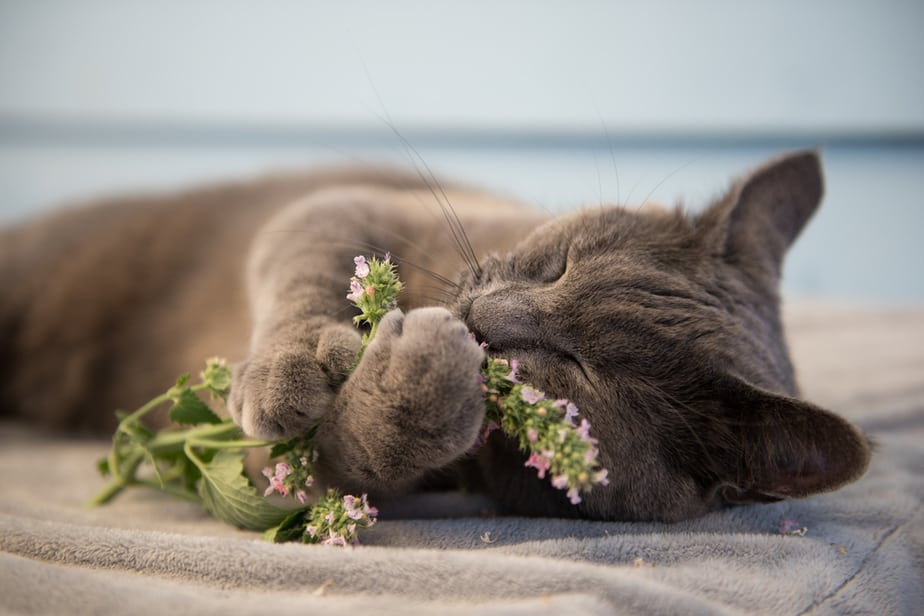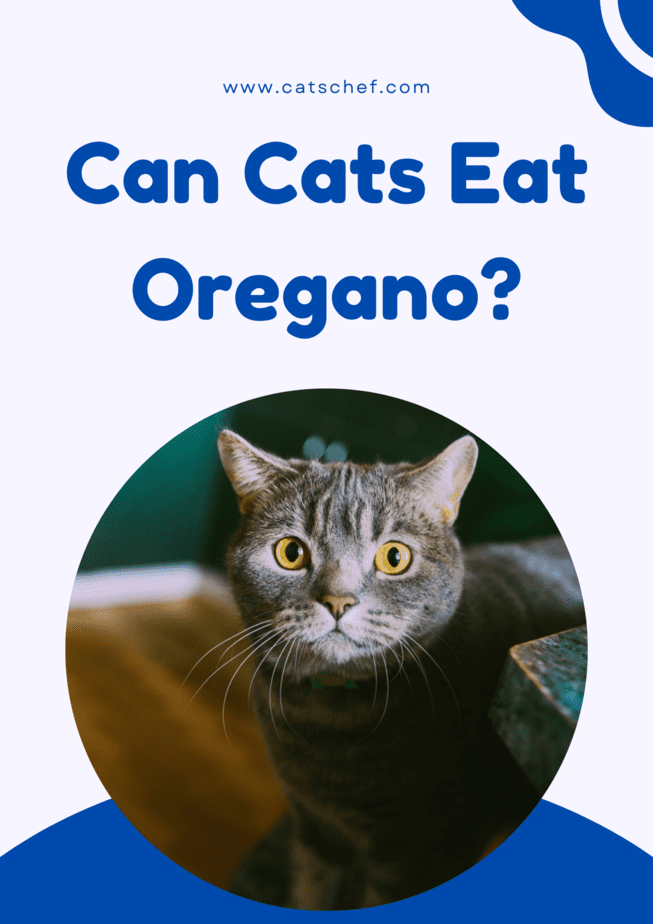📖 Table of Content:
Has your mischievous monster ever jumped on the kitchen counter looking to lick anything resembling food? How many times has she gotten herself in trouble because she nibbled on something that wasn’t supposed to be in her tummy!? Argh, can cats eat oregano?
Pizza sauce, pasta sauce… You can’t even imagine making Italian-inspired dishes without your favorite flavorsome herb. Oregano has become such a staple in your kitchen. You’re no longer surprised you keep finding oregano leaves everywhere you turn.
You can’t say you haven’t noticed your curious creature sniffing around your herb garden on more than one occasion, but… You haven’t given it much thought. Why would she munch on herbs when she’s got perfectly good cat food waiting for her in her bowl?
So, can cats eat oregano? You might be surprised to find out that the answer to your question is NO. Oregano falls under the category of culinary herbs that are unsafe for feline consumption.
According to the ASPCA (American Society for the Prevention of Cruelty to Animals), consuming oregano in any form might leave your little muncher with dangerous digestive issues and other health problems. Shocked to read that? Let’s get into it!
What is oregano?
Oregano is the common term we use to refer to an aromatic herb that’s typically made out of fresh or dried leaves of the plant, Origanum vulgare, which is Greek for “joy of the mountains.”
Other than being cultivated for culinary purposes, oregano can be found growing wild on Mediterranian mountainsides, which is why this unusual name is perfectly suitable. Oregano is typically used to add flavor, color, and texture to mouth-watering sauces and numerous Mediterranean dishes.
Dried oregano is more popular than fresh because it has a subtler taste. Fresh oregano has an incredibly strong aroma, and it can be used straight from your herb garden.
Fresh oregano is a great antibacterial agent for fighting infections. It contains heaps of antioxidants that help ward off bacteria and viruses. And, it’s an awesome source of vitamin K, manganese, iron, vitamin E, and calcium.
Oregano brings so much joy to humans, but your four-legged friend might not agree. Let’s find out why cats cannot eat oregano, shall we?
Can cats eat oregano?
There are so many incredibly beneficial herbs that are completely safe for feline consumption, but sadly, oregano isn’t one of them. Unfortunately, all forms of oregano are toxic to cats, regardless of whether it’s used orally or topically.
Pet parents shouldn’t even have an oregano plant in their herb garden! This aromatic herb might bring numerous health benefits to you, but is detrimental to your furry friend.
Unfortunately, essential oils found within the oregano plant make oregano toxic to cats. They contain naturally occurring organic chemicals called phenols and terpenoids.
Cats don’t have the same digestive system as humans do. So, your cat’s digestive tract doesn’t contain the enzymes that are necessary to break down and eliminate these chemicals.
More specifically, your cat’s liver lacks the glucuronyl transferase enzymes that are responsible for eliminating toxic substances from your cat’s body. Without the ability to digest phenols and terpenoids, they build up in her body, causing numerous health issues.
It’s safe to say that you should avoid bringing oregano into your household at all costs! Or at the very least, cat parents should make sure to hide any oregano plants, oregano oils, or oregano seasonings out of their furchild’s reach.
There are so many things that could go wrong if your four-legged friend gets into your herb garden (or even your secret oregano stash) and decides to have a feast. It’s better to stay on the safe side, and here’s why.
What will happen if my cat eats oregano?
Let’s say your feline friend accidentally eats a bite of something that might have a pinch of oregano in it. Your first instinct might be to rush to your computer and google “Can cats eat oregano?” While that’s a completely justified reaction, there’s no need for panic.
A small amount of oregano shouldn’t cause any serious damage to your cat. She might experience some digestive upset with symptoms such as excessive thirst, nausea, and diarrhea. Once she gets that tiny amount of oregano out of her system, she should be fine.
The problem arises when pet owners aren’t aware of the dangers this aromatic herb brings to the table. Because oregano is used medicinally in a lot of home remedies, they might assume it’s completely safe to use oregano oil on their cat.
Oregano oil is incredibly concentrated and packed with phenols and terpenoids. Consuming it on a daily basis may lead to oregano poisoning, severe gastrointestinal upset, and permanent liver damage.
The most common symptoms of oregano poisoning include nausea, vomiting, diarrhea, shallow breathing, difficulty walking, oral irritation, loss of appetite, and other signs of anorexia.
Large amounts of oregano oil might also lead to cardiovascular issues, as well as elevated blood pressure and heart rate. And in addition, if oregano oil gets on your cat’s skin and fur, she may experience incredibly uncomfortable skin irritations.
If you notice any of these symptoms, contact your vet immediately. It’s incredibly important that you disclose any home treatments you might have performed on your cat. This will speed up the diagnostic process and get your cat the medical attention she needs.
Can cats eat dried oregano?
It’s safe to say that fresh oregano and oregano oil shouldn’t be anywhere near your feline friend. If you have an oregano plant, make sure your cat can’t reach it. And, if you have oregano oil, you shouldn’t use it on your cat under any circumstances.
But, what about dried oregano? Is dried oregano safe for cats? Let’s just say that there’s no need to panic if you catch your cat munching on some dried oregano behind closed kitchen cabinet doors.
Dried oregano is much less concentrated in phenols and terpenoids. It’s far less likely to cause any serious damage to your cat’s health. But, don’t exclude the possibility of upset stomach, diarrhea, or even vomiting.
Some cats are more sensitive than others, so your feline friend might have a hard time digesting dried oregano. But, once this aromatic herb gets out of her system, she should be as good as new.
It’s important to mention that you should contact your vet in case your cat experiences a severe reaction to dried oregano.
But in short, to answer your question: Cats can’t eat dried oregano. This aromatic herb is toxic to cats regardless of its form. Dried oregano might not be as dangerous as fresh oregano, but it’s better to stay on the safe side when it comes to your furkid.
What about oregano oil?
Cats can’t eat oregano oil. As mentioned before, oregano oil contains high levels of phenols and terpenoids which are highly toxic to cats. They might lead to oregano poisoning, severe gastrointestinal upset, and even permanent liver damage.
Oregano essential oil is the worst and most hazardous form of oregano in the feline world. Under no circumstances should it be included in your cat’s diet. And, it goes without saying that you certainly shouldn’t use it on your cat’s skin or fur as a medical treatment (the way you would typically use it on yourself).
Believe it or not, most essential oils are incredibly damaging to your feline friend. Cinnamon, thyme, oregano, citrus oils, pine oils, lavender, bergamot, tea tree, eucalyptus… If you have any of these oils in your household, keep them out of your cat’s reach.
Diffused essential oils have become all the rage in the past couple of years. Unfortunately, your four-legged friend might experience serious health issues if she inhales some of those oregano oil droplets.
Not only are these oregano essential oil droplets dangerous themselves, but if your cat accidentally inhales any of them, she will be at risk of developing foreign body pneumonia. You might want to keep an eye on symptoms such as watery nose and eyes, drooling, vomiting, and difficulty breathing.
If you notice any of these, it’s time to get in touch with your vet immediately. And stop diffusing essential oils around your feline friend!
What other herbs should your cat avoid?
You got the answer to your “Can cats eat oregano?” question, but you’re still wondering about other herbs. Since oregano is so dangerous to your four-legged friend, does that mean you should uproot your entire herb garden to keep her out of harm’s way?
Well, maybe? Here’s the thing: There are plenty of herbs and plants that are completely safe for feline consumption. You should familiarize yourself with them because your feline friend might be interested in giving them a nibble or two.
On the other hand, there are a number of herbs and plants that could cause some serious damage to your cat’s health. Mint, lemongrass, chamomile, chives, and tarragon are only some that you want to avoid.
Mint is toxic to cats, according to the ASPCA. All parts of mint (leaves, flowers, and stems) contain essential oils which can lead to mint poisoning. This is quite unfortunate because cats absolutely love mint as it reminds them of their favorite herb, catnip.
Lemongrass, you guessed it, also contains essential oils which might harm your furry friend in the long run. Excessive amounts of lemongrass might lead to lemongrass poisoning, with symptoms such as vomiting, diarrhea, swollen abdomen, and excessive urination.
Chamomile might not be as harmful as some other herbs on this list, but it contains a variety of harmful substances such as tannic acid, anthemic acid, chamazulene, bisabolol, and volatile oil. It can cause some serious damage if consumed excessively over a longer period of time.
Chives (just like all other onion-family foods) are toxic to cats because they contain disulfides and thiosulphates. These compounds can cause your cat’s red blood cells to rupture, which can lead to anemia.
What herbs are safe for your cat?
If you’re looking to add some variety to your cat’s diet, you might want to look into herbs that have been labeled safe for feline consumption by the ASPCA. Catnip, cilantro, rosemary, thyme, basil, and dill… Feel free to let your furry friend bask in the benefits of these aromatics.
Catnip has to be the most popular herb in the feline world. Put this plant in every room of your house because it comes with numerous nutritional and health benefits. It reduces stress, stomach pain, and bloating. It’s also a great tool against feline boredom!
Cilantro is a great source of vitamins, minerals, and antioxidants that help your cat’s coat, immune system, bones, joints, and muscles. This herb is a great ally in preventing the onset of feline cancer.
Thyme can improve your cat’s digestive health. Not only does it suppress fungal and bacterial growth, but it can also help your cat get rid of those pesky hairballs.
As you can see, there are so many better alternative herbs you can feed to your cat instead of oregano!
Can cats eat oregano? Final verdict!
No, cats can’t eat oregano. According to the ASPCA, this aromatic herb isn’t considered safe for feline consumption. Too much oregano might leave your cat with gastrointestinal upset, oregano poisoning, and even permanent liver damage.
It’s better to stay on the safe side when it comes to your four-legged friend, so rather put those oregano plant pots away for now. Good luck!
